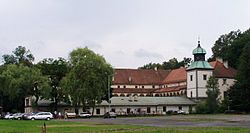Sucha Beskidzka
| Sucha Beskidzka | |||
|---|---|---|---|

Castle in Sucha
|
|||
|
|||
| Coordinates: 49°44′25″N 19°35′19″E / 49.74028°N 19.58861°E | |||
| Country |
|
||
| Voivodeship | Lesser Poland | ||
| County | Sucha | ||
| Gmina | Sucha Beskidzka (urban gmina) | ||
| Established | 1405 | ||
| Town rights | 1896 | ||
| Government | |||
| • Mayor | Stanisław Lichosyt | ||
| Area | |||
| • Total | 27.46 km2 (10.60 sq mi) | ||
| Elevation | 350 m (1,150 ft) | ||
| Population (2006) | |||
| • Total | 9,726 | ||
| • Density | 350/km2 (920/sq mi) | ||
| Time zone | CET (UTC+1) | ||
| • Summer (DST) | CEST (UTC+2) | ||
| Postal code | 34-200 | ||
| Area code(s) | +48 33 | ||
| Car plates | KSU | ||
| Website | http://www.sucha-beskidzka.pl | ||
Sucha Beskidzka [ˈsuxa bɛsˈkʲit͡ska] (before 1961 called only Sucha) is a town in the Beskid Żywiecki mountain range in southern Poland, on the Skawa river. It is the county seat of Sucha County. It has been in the Lesser Poland Voivodeship since 1999; previously it was in Bielsko-Biała Voivodeship (1975–1998).
Sucha Beskidzka lies in a basin, between the hills of the Beskids (Beskid Makowski and Beskid Maly), on the Skawa river. In 2002, Sucha had the area of 27,46 km2., with forests occupying 44%. The town is a rail junction, located along two lines – the 97th from Skawina to Żywiec, and the 98th from Sucha Beskidzka to Chabowka. The rail station PKP Sucha Beskidzka, together with a roundhouse was built in the 1880s.
Until 1964, the town was called Sucha. The adjective Beskidzka, added in that year, refers to the Beskidy Mountains.
In the late Middle Ages, the area of Sucha Beskidzka belonged to Duchy of Oświęcim. In the early years of the 15th century, Prince Jan III of Oświęcim initiated a program of settlement of the sparsely populated forested areas in the Beskids. In 1405, a man named Strzala was allowed to found a settlement, which later took on the name Sucha. Most likely, the Strzala family remained owners of the settlement until the late 15th century, when Sucha was transferred into the hands of the Słupski family. In 1554, Stanisław Słupski sold the village to an Italian-born goldsmith from Kraków, Gaspare Castiglione, who changed his name to Kasper Suski. Castiglione initiated the construction of the Sucha Castle.
...
Wikipedia



